Space
Sign up for our newsletter
We summarize the week's scientific breakthroughs every Thursday.
-
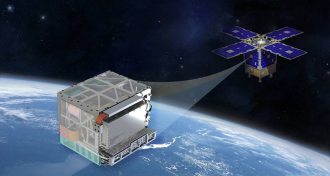 Tech
TechHow NASA’s portable atomic clock could revolutionize space travel
An atomic clock designed to enable self-driving spaceships and GPS-like navigation on other planets is about to take a yearlong test flight.
-
 Astronomy
AstronomyReaders boggled by black hole behemoth
Readers had questions about the first image of a black hole and a chytrid fungus.
-
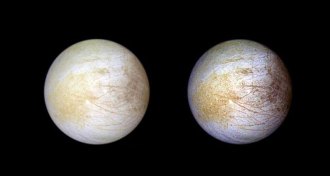 Astronomy
AstronomyTable salt may be hiding in Europa’s underground sea
Observations of Europa by the Hubble Space Telescope suggest that the moon’s ice-covered ocean may hold sodium chloride, or common table salt.
-
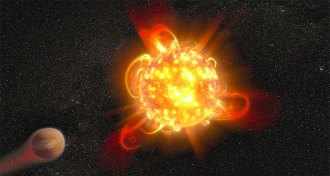 Astronomy
AstronomyMassive superflares have been seen erupting from stars like the sun
Older stars, like the sun, can still send out massive bursts of energy that can be seen from light-years away.
-
 Astronomy
AstronomyAstronomers may have spotted the ghost galaxy that hit the Milky Way long ago
Astronomers think they’ve identified a galaxy that hit the Milky Way and ruffled its edges millions of years ago.
-
 Chemistry
ChemistryCarbon plays a starring role in the new book ‘Symphony in C’
In Symphony in C, geophysicist Robert Hazen explores carbon’s ancient origins, its role in life and its importance in the modern world.
By Sid Perkins -
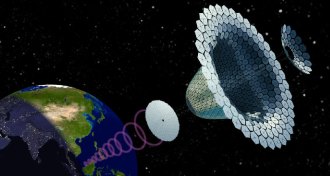 Astronomy
Astronomy50 years ago, scientists wanted to build solar panels on the moon
In 1969, scientists proposed building solar panels on the moon to convert the sun’s energy into electricity that can be used on Earth.
By Kyle Plantz -
 Astronomy
AstronomyIn a first, magnetic fields have been spotted between two galaxy clusters
The discovery of magnetic fields in the gaseous filament between two galaxy clusters suggests that some large cosmic structures are magnetized.
-
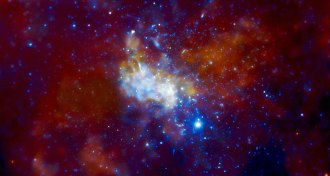 Astronomy
AstronomyThe accretion disk around our galaxy’s black hole has been spotted at last
The Milky Way's central black hole has a disk of gas and dust orbiting it, astronomers can finally say with confidence.
-
 Astronomy
AstronomyWatch the oldest surviving film of a total solar eclipse
A short film of the 1900 total solar eclipse was restored by conservation experts and is now available to view online.
-
 Astronomy
AstronomyQuestions about solar storms, slingshot spiders and more reader feedback
Readers had questions about solar storms, a robotic gripper, slingshot spiders and more.
-
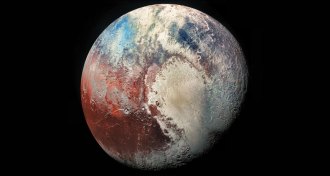 Planetary Science
Planetary ScienceIcy volcanoes on Pluto may have spewed organic-rich water
Planetary scientists found ammonia-rich ice near cracks on Pluto, suggesting the dwarf planet had recent icy volcanoes.